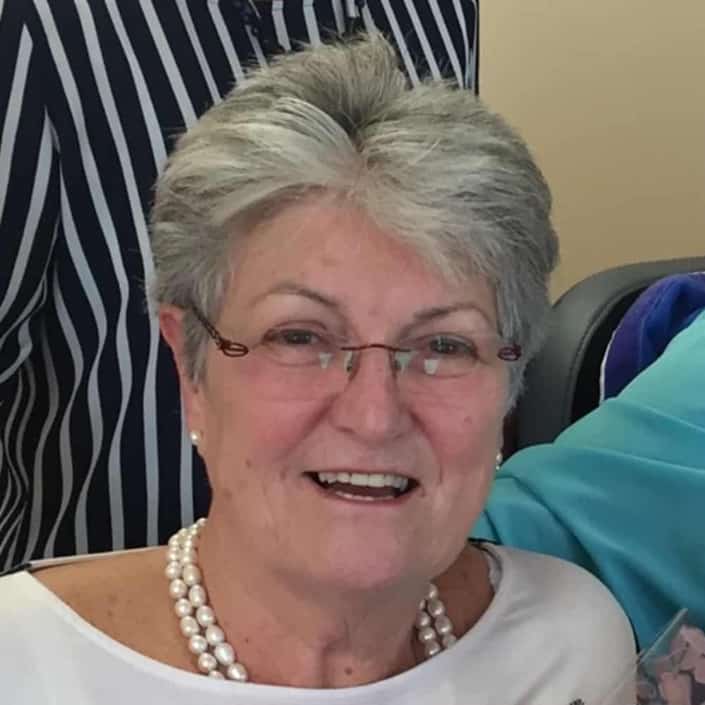Remembering Margaret Shearer
By Sandy Siegel I don’t remember when I first met Margaret Shearer. It had to have been around 2001. This was about the time that the Transverse Myelitis Association (TMA), which became the SRNA, began encouraging people to volunteer as support group leaders in the United States and around the world. Margaret was diagnosed with transverse myelitis and lived in Scotland. She was one of our first support group leaders and shared her story as a Hope Ambassador for SRNA. Her diagnosis of transverse myelitis became more complicated over the years, experiencing recurrent and challenging episodes. Margaret was a constant reminder of just how difficult these disorders can be and how much we don’t understand about any of them. Over the years, Margaret became one of the foundational members of the Association. She was tireless in her contributions to the organization and to our community. She was the very best example of the significant contributions a person can make to the world through selfless, generous, voluntary work. Margaret became a good friend of mine for more than two decades. I recently found out from her children that Margaret had passed away. I am personally saddened by the loss of such a decent and kind human being and from the loss of such a good friend. When Margaret established the Scotland Support Group, she changed lives for people diagnosed with rare neuroimmune disorders from her country, from the UK, and from Europe. She quickly developed a relationship with Geoff Treglown who lived in England. Geoff began working with me, with the help of Lew Grey, to print and distribute newsletters and new member packets to our members across Europe. Margaret and Geoff developed a close collaboration, and in doing this support and education work, also became very close friends. I learned of Geoff’s death through a phone call with Margaret. Margaret was a sweet, kind, and gentle soul. Margaret held regular support group meetings for our membership across Scotland and she was there for people during their diagnosis and through the many travails associated with these rare disorders. She was available for those diagnosed and their families. She regularly held education programs to help her support group members to become more effective advocates for their medical care. Shortly after Dr. Douglas Kerr established the Johns Hopkins Transverse Myelitis Center, she invited him and Chitra Krishnan (then, Doug’s research coordinator) to attend an education program. It was an amazing event for all involved. Shortly after Cody and Shelley Unser established the Cody Unser First Step Foundation, they held their first scuba adventure. Cody had learned and used scuba diving as a part of her rehabilitation therapy. Being in the water offers some special, and I would say magical, qualities to quality of life for people living with paralysis. Beyond all the obvious exercise benefits, being in the water offers a freedom of movement that doesn’t exist when dealing with gravity. Cody was driven to offer the many benefits of scuba to the community of people who had some form of paralysis from disorders like TM or from trauma. Pauline was invited to attend the first adventure. I’ve written about it elsewhere and won’t get into the details here. It was a transformative experience. Through my writings, Margaret learned about scuba diving, and she learned about Cody and Pauline’s involvement. Margaret decided that, like these other women who had learned scuba diving and who had a great love for it, she also wanted to give it a try. Margaret became certified and developed her own passion for scuba diving. Margaret was an adventurer and a great world traveler. Her sons and their families lived all over the world. Regardless of the physical difficulties she experienced daily, she regularly traveled the world to be with the family she so loved. Her annual holiday cards were always filled with news of her children and grandchildren, along with a recounting of all of her adventures. Margaret’s life was filled with the physical burdens that all of you are so familiar with from your own experiences. In her own way, and with little fanfare, Margaret figured out how to live her life to the fullest while finding ways to make the most profound difference in this world. She elevated the work we do at the Siegel Rare Neuroimmune Association, giving her time as a volunteer. All she ever got from me for all these efforts was my deepest respect, gratitude, and love. And for Margaret, that was more than enough. Margaret was the best of us. She was loved and she will be so missed by the SRNA, by her friends and family and by the community she was there to support for many years. We love you, Margaret. Her memory should be a blessing.






